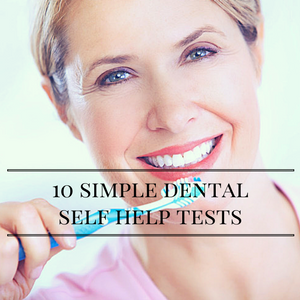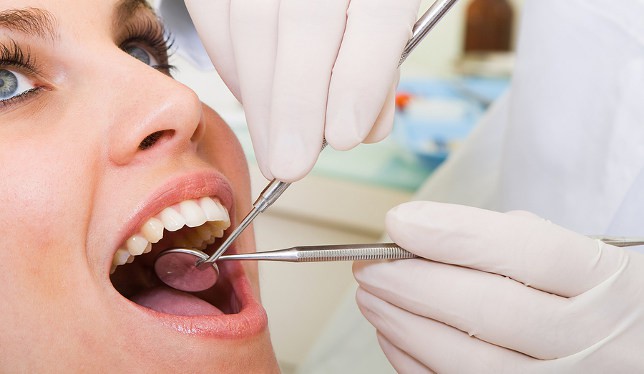10 Simple Dental Health Self Tests

1. Are you brushing in the morning and at night time?
Yes: Brushing twice a day is very important for optimal dental health and good oral hygiene. Brushing reduces the bacterial load in your mouth and can help prevent gum disease, bad breath, and teeth staining.
No: There are many reasons why brushing in the morning and at night time is extremely important. By brushing twice a day, plaque can be removed before it hardens into position. Tartar is actually plaque that has calcified onto the teeth. The hardening process that changes plaque into tartar usually takes around a day to complete.
The most important and most thorough tooth brushing session should occur before bedtime as there is less saliva produced overnight which is essential for acidic neutralisation which helps prevent tooth decay. Failing to brush twice a day increases your chances of obtaining gum disease and will increase the amount of tartar and stain build up, bad breath and tooth decay.
2. Do you floss your teeth regularly?
Yes: Flossing your teeth at least once a day will help remove plaque from the tricky areas between your teeth where your toothbrush can’t reach.
No: Flossing helps remove plaque and food particles trapped between the teeth and under the gum line where your toothbrush bristles cannot reach. Research has shown that regular flossing can prevent tarter build up and tooth decay. The bacteria found in plaque have been linked to serious health conditions such as Diabetes, Cardiovascular Disease, Alzheimer’s and Hodgkin’s Disease.
3. When brushing your teeth, do your gums bleed?
Yes: Periodontal or gum disease is a widespread problem that can have many harmful effects on your health. It is not something that occurs overnight but usually, results from long-term neglect of the teeth and gums. If you have painful gums or gums that bleed easily, these may be symptoms of periodontal disease. If untreated, this can lead to painful inflammation of the gums, loose teeth and even lost teeth. It is extremely important to brush your teeth twice daily and floss once a day.
No: By brushing your teeth twice daily and flossing once a day this will help prevent gum disease (gingivitis) or periodontal disease a more serious form.
4. Are you using a soft toothbrush?
Yes: That’s great! Our dentists recommend brushing with a soft tooth brush and a pea-sized amount of tooth paste, and do not forget to brush your tongue.
No: Using a hard toothbrush increases erosion of tooth enamel which can cause sensitivity and in severe cases tooth decay. Using a soft toothbrush will prevent gum irritation and is less likely to contribute to receding gums.
5. Do you snore?
Yes: Sleep Apnoea is a serious sleep disorder that occurs when a person’s breathing is interrupted during sleep and is linked to many other health conditions including dry mouth which contributes to dental decay. Make sure you check with your dentist that your snoring is not having an effect on your health. If the dentist detects the possibility of sleep apnoea they can discuss potential future treatment options with you.
No: It is important to ask your partner or someone close to you if you snore, because you may not be aware you are. Snoring can lead to dry mouth and in other serious cases- Sleep Apnoea.
6. Do you wake up with a dry mouth?
Yes: Loss of tooth enamel is more common in people who don’t produce enough saliva and people who take medications that dry out the mouth. Medications including high blood pressure medications, antihistamines, antidepressants, diuretics, nonsteroidal anti-inflammatories, narcotics, and many others can cause a decrease in saliva production. Dry mouth can lead to tooth decay so it is very important to keep a healthy saliva flow. Some ways include limiting mouth breathing, avoiding caffeine, alcohol, and tobacco, chewing gum and drinking water frequently.
No: Certain medications and snoring can both cause dry mouth. It is important to let your dentist know if you snore or are taking/changing any medications so that they are aware of the possible side effects and therefore the management surrounding them.
7. Do you drink a lot of highly acidic foods/drinks (eg: fruits/fruit Juices)?
Yes: Tooth decay can be caused by acids and whilst you may think you’re eating a healthy option, fruits actually have naturally occurring acids in them. Acidic foods such as oranges, lemons, lime, grapefruit, tomato products (pasta sauce, ketchup, salsa, hot sauce) wine and coffee all eat away at your enamel and break down your teeth directly. If you choose to have these food and drink options on a daily basis you can help wash away the natural acids by drinking water.
No: Common fruits such as oranges, lemons, limes and grapefruit are a healthy snack option but are also very acidic, it is important to remember to drink water whilst you consume any of these items to wash away these acids and prevent damaging the tooth enamel.
8. Are you taking more than 2 prescription medications?
Yes: Some medications can have an impact on your oral health. It is important to speak to your doctor and dentist so that they can manage any side effects that could impact on your oral health and dental care as some medication can cause dry mouth which leads to tooth decay.
No: Most medications have side effects which are why it is very important to keep your dentist up to date with the medications you are taking and if there have been any changes at each visit. This ensures the dentist is aware of the possible side effects and the management surrounding them.
9. Have you noticed any unusual spots or sores in your mouth that you have not had assessed yet?
Yes: It is very important to get any unusual sores, spots or lesions checked by your dentist. If you have noticed a lesion, spot or sore that has not gone away within a 2 week period this can indicate you may have some form of oral cancer. Oral Cancer is one of the rare forms of cancer but you are more prone if you are a smoker and/or drink heavily, as well as a number of other lifestyle factors.
No: Make sure like the rest of our body we check for any unusual spots or sores in the mouth as well. If you do notice any unusual sores, spots, lesions ect, get them checked out by your dentist as soon as possible.
10. Do you visit your dentist on a 6 monthly basis?

Yes: That’s excellent! Our team recommends regular assessment of your overall oral health to help identify any problem areas early. Timely intervention of a problem with a simple procedure can lead to less complex treatment in the future.
No: At a 6 monthly examination the dentist will look at your teeth, gums, and mouth, to look for any changes or signs of a problem (for example, tooth decay, gum disease or early signs of oral cancer). By picking up any changes or problems early this will lead to the prevention of major dental work in the future and is far more cost effective than allowing problems to go on undetected.
